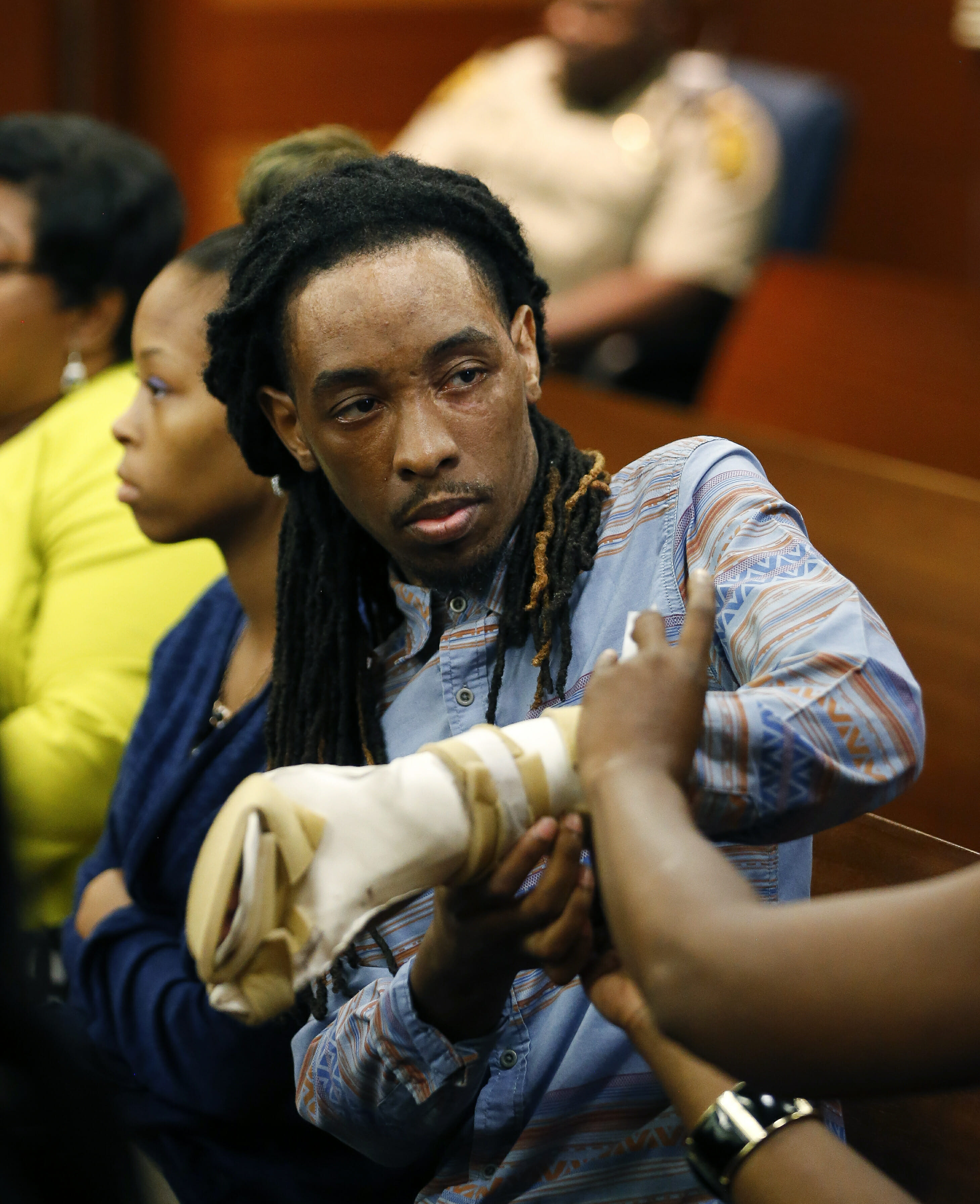
Georgia still has no hate crimes law despite many tries
ATLANTA (AP) — A Georgia man convicted of throwing scalding water on a sleeping same-sex couple told one of them to “get out of my house with all that gay,” a victim testified, yet he couldn’t be charged with a hate crime because the state has no such law.
Victim Anthony Gooden said in a recent interview that he still can’t use his left arm, which was severely burned in the 2016 attack, and wears a brace. He can’t tie his shoelaces or work. Martin Blackwell was sentenced to 40 years in prison for the crime.
“Forty years is not enough to have your skin turn different shades of colors and peel off,” said Fani Willis, who prosecuted the case and said she would have considered using a hate crimes charge. “Those young boys were burned because of their sexuality. We have to acknowledge that it was a hateful reason.”
Georgia is one of only four states — along with South Carolina, Wyoming and Arkansas — without an official hate crimes law. The state Supreme Court overturned a previous law in 2004 and bills that would have brought Georgia in line with federal law failed to pass over the past two legislative sessions.
Advocates, including district attorneys, say a hate crimes law is important to send a message of validation to victims and intolerance to perpetrators. Gooden’s case is just one in which Georgia prosecutors might have considered using a hate crimes law.
In late 2016, an admitted member of the Aryan Brotherhood was in a passenger seat of a truck when he shot at a black driver’s car and then yelled racial slurs in the presence of police. In 2015, a couple interrupted an African American child’s birthday party with Confederate flags, racial slurs and armed threats. That same year, a former fire captain pointed a pistol at an African American couple while yelling racial slurs at them outside an Applebee’s.
Those cases resulted in lengthy prison sentences, but a hate crimes law could have extended their terms.
The most recent Georgia bill would have added penalties for those convicted of targeting victims based on race, color, religion, national origin, sexual orientation, gender, and mental or physical disability. Any hate crime tied to a misdemeanor offense would result in up to one additional year in prison; a hate crime tied to a felony would mean at least two additional years.
States have been passing hate crimes laws since the 1980s, but they vary. A 2009 expansion of the federal hate crimes statute enacted under former President Barack Obama included sexual orientation and gender identity as protected categories, but 16 states with a hate crimes law do not explicitly protect either group, according to the Human Rights Campaign, a national LGBTQ advocacy group.
LGBTQ protections have becoming a sticking point for from some Republicans and their religious base.
“We do find it troubling when terms such as ‘sexual orientation’ or ‘gender identity’ become a higher standard of prosecution for certain crimes,” said Mike Griffin, a spokesman for the Georgia Baptist Mission Board, which represents more than 3,500 churches. Griffin added that no one should be mistreated or physically abused because of their sexuality.
The most recent Georgia bill, sponsored by a Republican, got stuck in a Senate committee after passing the House. Senate Judiciary Chairman Jesse Stone, a Republican from Waynesboro, did not respond to phone calls requesting comment on why the bill was not heard in his committee. Stone previously said he believes victims should have an equal chance at justice and isn’t sure increased penalties for crimes against certain people is the best way to go, according to The Atlanta Journal-Constitution.
Some states have passed hate crime laws that prosecutors say are too vague to be enforced.
In April, Indiana’s governor signed a hate crimes law that did not explicitly cover age, sex or gender identity. “It’s going to be ruled unconstitutional because it doesn’t have specific provisions,” said Shelley Rose, deputy regional director of the Atlanta chapter of the Anti-Defamation League, which advocates for robust hate crimes laws. “It’s exactly what happened here in Georgia.”
In 2004, the Georgia Supreme Court struck down a 2000 hate crimes law, saying it was “unconstitutionally vague” and so broad that it would even apply to a rabid sports fan picking on somebody wearing a rival team’s cap.
The 2000 measure was about to fail in Georgia’s legislature when Republican Rep. Dan Ponder gave a personal speech reflecting on his conservative Southern upbringing and his ancestors owning slaves that led to a standing ovation. The bill passed on a 116-49 vote.
Ponder said in a recent interview that he was disappointed that, almost two decades later, Georgia still has no hate crimes law.
“I think, amazingly, in 2019, this is still somewhat related to the gay issue,” Ponder said. “It’s about the impact it will have on the Republican base.”
The Western Journal has not reviewed this Associated Press story prior to publication. Therefore, it may contain editorial bias or may in some other way not meet our normal editorial standards. It is provided to our readers as a service from The Western Journal.
Truth and Accuracy
We are committed to truth and accuracy in all of our journalism. Read our editorial standards.
Advertise with The Western Journal and reach millions of highly engaged readers, while supporting our work. Advertise Today.












